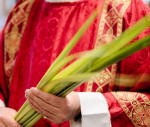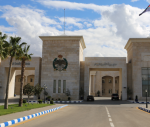You are here
Algeria elects parliament amid 'repression' of protest movement
By AFP - Jun 13,2021 - Last updated at Jun 13,2021

A man casts his ballot at a polling station in Bouchaoui, on the western outskirts of Algeria's capital Algiers, on Saturday during the 2021 parliamentary elections (AFP photo)
ALGIERS — Algeria voted on Saturday in a parliamentary election overshadowed by a crackdown on a long-running protest movement that has campaigned for a mass boycott.
Pro-government parties have urged a big turnout for the "crucial vote" which they hope will restore stability after two years of turmoil since the forced resignation of veteran president Abdelaziz Bouteflika.
The protest movement, which had held weekly demonstrations for reform until they were effectively banned last month, has denounced the election as a "sham" that betrays the hopes of the hundreds of thousands of Algerians whose protests forced Bouteflika from power.
Seven leading protest movement figures were arrested ahead of polling day while police deployed heavily in the capital Algiers to preempt any attempt to rally.
Polls close at 7:00 pm (18:00 GMT) and results are not expected before the coming days.
Authorities are hoping for a solid turnout, but the two previous national votes since Bouteflika stepped down — a presidential election and a constitutional referendum — both saw record low voting after the protest movement urged a boycott.
In Algiers, only a trickle of people were seen entering polling stations on Saturday morning, with most people getting on with their daily lives.
"I've never voted, and this time it's no different. I don't believe it would change anything," said Fatiha, a shopkeeper in her 50s.
Hamid, a 60-year-old office manager, said he had voted for the sake of "stability".
"We are surrounded by danger. Those who reject this election aren't putting forward any realistic alternative," he said.
In the opposition stronghold of Kabylie, a mainly Berber region east of the capital, most polling stations in the main cities of Bejaia and Tizi Ouzou remained closed, said Said Salhi, deputy head of the Algerian League for the Defence of Human Rights (LADDH).
Boycott calls from the region's two main parties were almost universally respected in the previous two votes since Bouteflika's ouster.
President Abdelmadjid Tebboune, who was elected on an official turnout of less than 40 in late 2019, put a brave face on the likely low legislative turnout.
“For me, it’s not the turnout percentage that’s important, it’s whether the lawmakers that the people elect have sufficient legitimacy,” the president said after casting his vote at a polling station on the outskirts of Algiers.
More than 13,000 candidates are standing for the 407 seats in parliament, more than half listed as “independent”.
‘Repressive atmosphere’
The LADDH vice president deplored the crackdown that preceded the vote.
The “repressive atmosphere and the restrictions placed on human rights and freedoms mean these elections have no democratic value”, Salhi said.
The protest movement has urged boycotts of all national polls since it mobilised hundreds of thousands of people in 2019 to force Bouteflika and his cronies from power, after the ailing president launched a bid for a fifth term.
It returned to the streets in February after an almost-year-long break caused by the COVID pandemic.
But the government stepped up its crackdown last month, blocking protests and detaining hundreds of activists who have defied new restrictions on public gatherings.
Late Thursday, leading opposition figure Karim Tabbou, independent journalist Khaled Drareni and the director of a pro-reform radio station, Ihsane El Kadi, were among seven people detained. The three were eventually released on Friday night, a campaign group said.
“These arrests mark a chilling escalation in the Algerian authorities’ clampdown on the rights to freedom of expression and association,” Amnesty International said in a statement, reporting more than 200 people were in detention in connection with the protest movement.
Old guard and economic woes
The president claims to have responded to the protesters’ main demands “in record time”, and says those still protesting are “counterrevolutionaries” in the pay of “foreign parties”.
The protest movement says Tebboune’s past role as premier under Bouteflika confirms its narrative that the old guard, in power since Algeria’s 1962 independence from France, retains an undiluted grip on power.
Established parties linked to Bouteflika’s rule, the National Liberation Front and the Democratic National Rally, are seen as likely to lose seats.
Islamist parties are hoping to take advantage — but with their vote split between five rival factions, they may struggle to make real gains.
Africa’s fourth-largest economy is heavily dependent on oil revenues, which have slumped in the face of the global economic slowdown. Unemployment stands at more than 12 per cent, according to World Bank figures.
It has also been hit hard by the coronavirus pandemic, which has claimed more than 3,500 lives in the country, according to the health ministry.
Related Articles
ALGIERS — An Algerian rights group on Monday decried “escalating repression” ahead of next month’s parliamentary election, the latest poll t
ALGIERS — A leading Algerian opposition activist has been detained and is to appear before prosecutors on Thursday, his lawyer said, weeks
ALGIERS — Algerian President Abdelmadjid Tebboune underwent a successful foot operation in Germany on Wednesday after post-COVID-19 complica
















